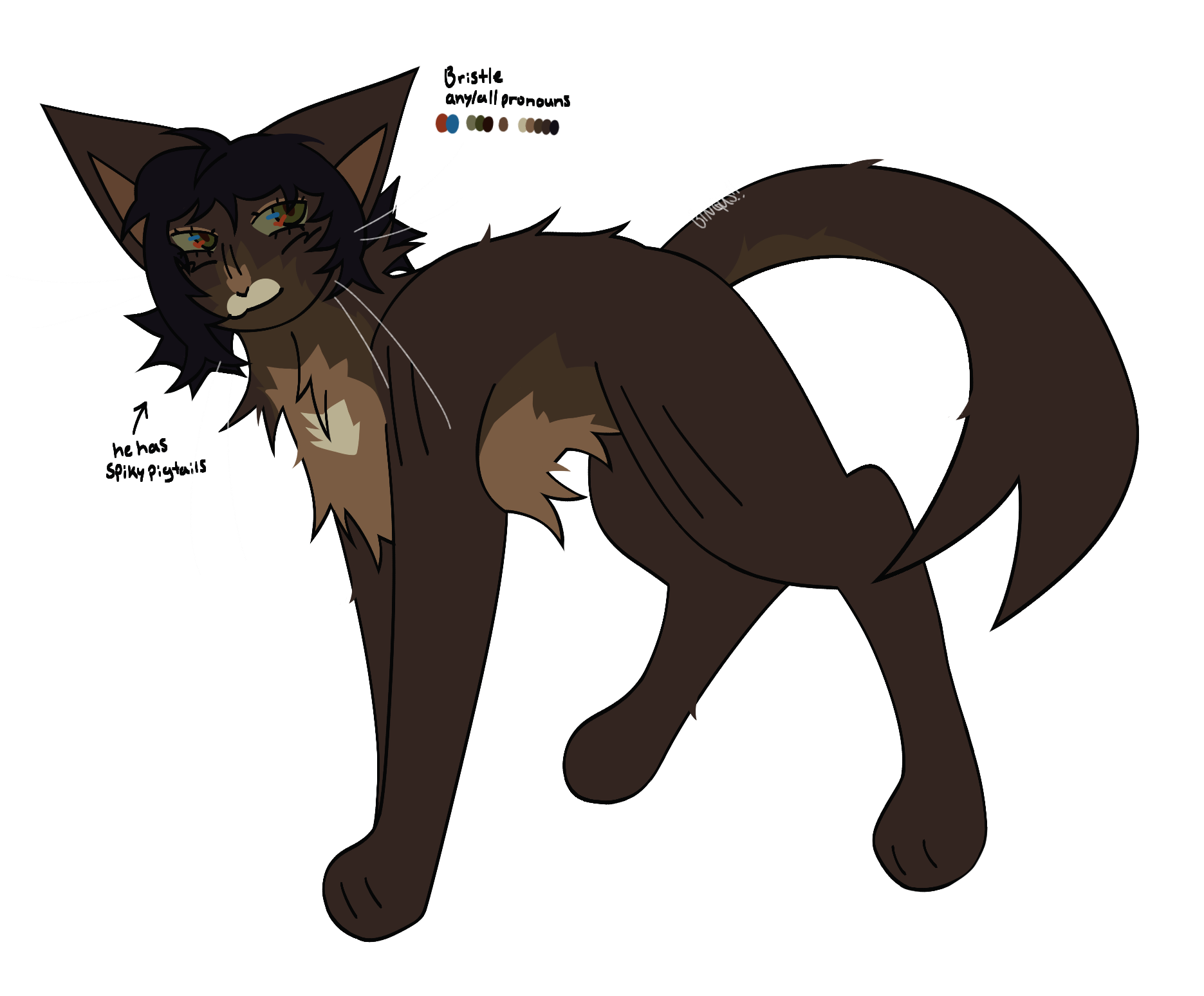
The Raspberries
Whistle, Bristle, and the founding of the Raspberries
 The Raspberries were founded by a cat named Bristle, with support from her then friend, Whistle. Having relied on each other during their time under testing, the two were nearly inseparable, how could Whistle have denied when Bristle had said they wanted to head to the north, away from the human settlement? A fine amount of cats decided to join them on their journey. After all, many were unnerved by the sharp angles, the acidic familiarity of the village. Around the same time, another group decided to leave to the east, later becoming the Cloudberries.
The Raspberries were founded by a cat named Bristle, with support from her then friend, Whistle. Having relied on each other during their time under testing, the two were nearly inseparable, how could Whistle have denied when Bristle had said they wanted to head to the north, away from the human settlement? A fine amount of cats decided to join them on their journey. After all, many were unnerved by the sharp angles, the acidic familiarity of the village. Around the same time, another group decided to leave to the east, later becoming the Cloudberries.
What Whistle did not know at the time, though, was that Bristle's frantic discomfort was not only stirred on by the village, but by Bartholomew himself. Shortly before their departure, Bristle had seen it: the blood that gushed forth in a torrent from that mewling weakling—a life, surely, no cat would miss—and he had heard it, bones crunching beneath massive fangs; slimy viscera sluicing between enamel, but worst of all, he had heard the plaintive cries coming from the poor leper, distinctively those of a cat.
The group would end up in the marshy area to the north-west of the island, and set up camp in the shadow of a rocky outcropping. Life was, as always has been, hard, but the group managed to persevere. Unfortunately, Bristle's condition, its eccentricities, would only worsen as time went on. Whistle watched, unable to help his dear friend, unable to alleviate her worries. Guilty, he felt, angered by his own uselessness—like mold, his shame would grow, souring what little the pair had left.
This malady, this infectious blight on their relationship would finally reach its fever pitch on a pleasant afternoon. Whistle offered to go out on a walk with Bristle. There, under the fading sunshine, Whistle would attempt to kill Bristle, eclipse them. Halfhearted, this attempt was; Phobos against Mars. And there, Bristle would look on in horror, as Whistle's very life seeped out from him; swirling into the murky water and intermingling with the crimson sun. A planet, unbound from its star, drifting alone in the aether.
Unable to bear the weight of its sin on its back, unable to understand why Whistle had done what he had done, Bristle would lie to the colony. Perched atop the rocky spire, she would preach: that Whistle was evil, a trespasser upon lands holy, a cruel recusant against their savior, their god. The colony, of course, believed them, even as their teeth rotted with the plaque of lies, fervor only growing as mocking eidola of the miscreant made their appearance, and so, Bristle's final proclamation would ring out: that their god must be fed.
The revenant never meant any harm, only to tell Bristle that he loved him.
Raspberries Territory
While the Cloudberries and the Blackberries have fairly monocultural territories, the Raspberries' territory is a gestalt of many differing habitats. The largest portion of it is made up of fen, which then bleeds into the western edge of the Blackberries' forest, creating a swamp. To the southern edge of the territory, the fen dwindles away, becoming harsh tundra. On the western reaches of the territory is a grove of middling size, primarily composed of deciduous arbor. Finally, heading northward will lead to the coast. Unlike the Cloudberries' beaches, the shore is rocky and steep, unsuitable for traversal. In contrast to the other colonies, the Raspberries also have rather flat land—windblown and cold—with little cover provided by the fen's occasional shrubbery.The Raspberries' camp is built in the depression of a rocky outcropping, shielding it from southern winds. Stout, but effective tree-cover has been cultivated around the confines of the camp. Wooden platforms have been built around the camp, and onto the rockface. Large swathes of sphagnum moss are hung from the edges of these elevated platforms, providing further relief for those on lower ground. Grounded platforms have been entwined with the roots of nearby plants which supply steadfast support. In the centre of the camp is a dead body, said to be that of Bristle, submerged and preserved partially within the fen's waters. Around its body, a communal garden is hosted. Water-crowfoot, watercress, reeds, sedges, venus flytraps, and many more all burst forth in a wonderful display. A memorial to the sibyl.

Return

